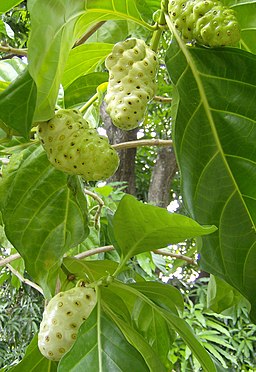Today we are going to talk about one of the fruits with more nutritional and medicinal properties that exist, noni. It is highly antioxidant, helping, among other things, to strengthen the immune system.
It is considered native to Southeast Asia and is very common in Polynesia and Melanesia, many scientists say that the plant is native to India. It is a very fragile fruit, which grows properly in virgin lands and soils of volcanic origin near the coast, where no pesticides or chemicals are used in its cultivation. In our Eco Finca Tecina, we cultivate it this way.
It is the size of a potato, its appearance resembles a cherimoya and has a yellowish color that turns white when ripe. Its flavor is bitter and its smell is strong so it is usually consumed in juice combined with other fruits.
It is thought to have reached the Polynesian Islands from India, and was used by the Polynesian healers in all their medicinal preparations to treat fevers, diarrhea, asthma, insect bites, burns, wounds, indigestions. root to the flowers. The infused root was used to treat high blood pressure and flowers to combat eye problems. It was considered a sacred plant, a medicinal plant whose uses were collected in stories and songs in certain families and transferred from generation to generation, usually from mothers to daughters.
The earliest medical reference to noni appears in the ancient texts of traditional Indian medicine, Ayurvedic medicine and goes back several thousand years.
Some of the beneficial health effects of noni:
- Fights infections as it has a great antimicrobial effect.
- Improves defenses by stimulating the production of T lymphocytes (a class of white blood cells responsible for so-called cellular immunity).
- Promotes cell regeneration.
- It is antioxidant and prevents the premature aging of tissues.
- It is analgesic and anti-inflammatory, beneficial for people suffering from rheumatoid arthritis, fibromyalgia, etc.
- Helps lower blood cholesterol and triglyceride levels.
- It is antiparasitic.
- Improves digestion.
- Helps regulate blood pressure and the hormone serotonin which helps reduce anxiety.
Today, noni is considered as a food not a medicine, which ingested as a dietary supplement has restorative or regenerative effects at the cellular level and that in combination with medicines can cooperate in the improvement of some diseases.
Its composition is extraordinary from the nutritional point of view since it is rich in minerals (magnesium, sodium, potassium, calcium, zinc, copper), fiber, vitamins A, C, B1, B2, B6 and B12, amino acids, scopolamine, flavonoids plus
Many scientists have tried to find the origin of the medicinal properties of noni. According to studies by biochemist Dr. Ralph Heinicke, it would also contain xeronine and significant amounts of proxeronine.
One of the arguments used by Dr. Heinicke to explain the properties of noni is the presence in the fruit of an alkaloid that he named xeronine and proxeronine, precursor of xeronine. These substances were discovered by this scientist in the 1950s when he studied the properties of pineapple and later found these components in noni, whose content in concrete of proxeronine is 800 times greater than in pineapple.
According to their hypothesis, xeronine is an alkaloid that helps the body’s proteins to function properly and repairs them. He also discovered that noni contains in abundance proxeronine and the essential enzymes the body needs to make xeronine.
When the body ingests proxeronine becomes xeronine, for this the noni must be taken on an empty stomach, 15 minutes before ingesting any other food.
Proxeronine, according to these studies, would be less and less present in fruits and vegetables due to non-biological cultivation, using pesticides and chemical fertilizers.
There are other scientists who deny the hypothesis about the regenerative properties of xeronine.
Regardless of doubts about the ability of xeronine, the healthy properties of noni are undeniable and are backed by a long therapeutic tradition of medicinal plants by the Pacific and Indian peoples who have included noni in their treatments for centuries.

